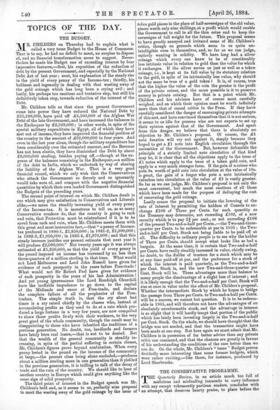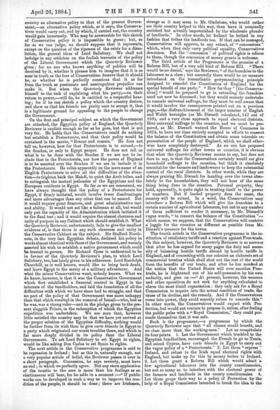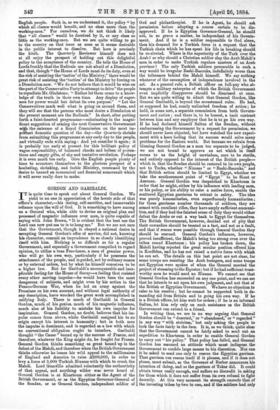THE CONSERVATIVE PROGRAMME.
THE Quarterly Review, in an article much too full of malicious and misleading innuendo to carry influence with any except vehemently partisan readers, concludes with an attempt, that deserves hearty praise, to place before the country an alternative policy to that of the present Govern- ment,—an alternative policy which, as it says, the Conserva- tives would carry out, and by which, if carried out, the country would gain immensely. Who may be answerable for this sketch of Conservative policy it is impossible to guess ; but, so far as we can judge, we should suppose that it represents, except on the question of the ripeness of the crisis for a disso- lution, the general ideas of Lord Salisbury. We shall not indulge in any criticism on the foolish travestie of the policy of the Liberal Government which the Quarterly Reviewer gives ; for no one who knows anything of politics will be deceived by it, whether it pleases him to imagine that it is as near to truth as the foes of Conservatism deserve that it should be, or whether he is perfectly conscious that it as far from the truth as passionate and unscrupulous prejudice can make it. But when the Quarterly Reviewer addresses himself to the task of explaining what his party,—on their return to power,—will do, he is entitled to a respectful hear- ing; for if he can sketch a policy which the country desires, and show us that his friends are pretty sure to accept it, that is a legitimate ground for appealing to the people to change the Government.
On the first and principal subject on which the Government are attacked, the Egyptian policy of England, the Quarterly Reviewer is explicit enough as far as he goes, but that is not very far. He holds that the • Conservatives could do nothing but establish a Protectorate, and that their policy would be contained in the motto, "Rescue and remain." He does not tell us, however, how far that Protectorate is to extend,—to the Soudan, or only to Egypt proper. He does not tell us what is to be done with the Soudan if we are not to in- clude that in the Protectorate, nor how the power of England is to be asserted over the Soudan if we are to include it in the Protectorate. He relies apparently on the mere name of an English Protectorate to solve all the difficulties of the situa- tion—to frighten back the Mandi, to quiet the Arab tribes, and to extinguish the mutual jealousies of the Egyptians and the European residents in Egypt. So far as•we are concerned, we have always thought that the policy of a Protectorate for Egypt, if firmly initiated, would involve fewer disadvantages and more advantages than any other that can be named. But it would require great firmness, and great administrative tact and ability. It would not act like a talisman at all, but would only put the capacity of the Administration which initiated it to the final test ; and it would require the utmost clearness and unity of purpose in any Cabinet which should establish it. What the Quarterly Reviewer, unfortunately, fails to give the smallest evidence of, is that there is any such clearness and unity in the Conservative Cabinet on the subject. Sir Stafford North- cote, in the 'very last Egyptian debate, declared his policy in words almost identical with those of the Government, and warmly asserted his wish to establish a native government which could be trusted to govern. Sir Richard Cross is understOod to be in favour of the Quarterly Reviewer's plan, to which Lord Salisbury, too, has lately given in his adherence. Lord Randolph Churchill, as is well known, would like to bring back Arabi, and leave Egypt to the mercy of a military adventurer. And what the minor Conservatives want, nobody knows. What we do know, however, is that it was the Conservative Government which first established a financial control in Egypt in the interests of the bondholders, and laid the foundation of all the difficulties with which we have since had to struggle, and that no part of the policy of that Government was more unhappy than that which resulted in the removal of Ismail—who, bad as he was, was a strong ruler—and in the pledge given to the pre- sent sluggish Prince, in the redemption of which the Egyptian expedition was undertaken. We are sure that, however little satisfied the country may be that we have yet arrived at the proper solution of the Egyptian difficulty, nothing would be further from its wish than to give carte blanche in Egypt to a party which originated our worst troubles there, and which is far more deeply divided in its policy than the Liberal Government. To ask Lord Salisbury to set Egypt to rights, would be like asking Don Carlos to set Spain to rights.
The next article in the Conservative programme is said to be repression in Ireland ; but as this is, naturally enough, not a very popular article of belief, the Reviewer passes it over in a short paragraph. Concession, he says severely, must have an end ; in which we perfectly agree. But any stern application of the caustic to the sore is more than his feelings as an electioneerer will bear, for he adds in a moment :—" If public works can be developed in such a way as to improve the con- dition of the people, it should be done ; there are Irishmen, strange as it may seem to Mr. Gladstone, who would rather see their country helped in this way, than have it nominally enriched but actually impoverished by the wholesale plunder of landlords." In other words, let Ireland be bribed in any fashion that bribes the landlords too. If that can be managed, Conservatives will approve, to any extent, of "concessions," which, when they only carry political equality, Conservatives denounce. But the " concession " of political rights is odious to them, though the concession of money grants is welcome. The third article of the Programme is the promise of a Reform Bill, but of a very odd kind of Reform Bill. "There would be no denial," says the Reviewer, 46- of the franchise to the labourers as a class ; but assuredly there would be no measure introduced on the transatlantic gerrymandering principle designed to remodel the Constitution of England for the special benefit of one party." " How far they " [the Conserva- tives] " would be prepared to go in extending the franchise need not now be discussed ; but they would scarcely undertake to concede universal suffrage, for they must be well aware that it would involve the consequences pointed out on a previous page,—the disfranchisement of the larger number of English and Welsh boroughs (as Mr. Disraeli calculated, 147 out of 198), and a very close approach to equal electoral districts. Give universal suffrage to the counties, and we must be pre- pared, as Mr. Disraeli warned the House of Commons in 1874, to have our time entirely occupied in efforts to reassert the balance of the Constitution and obtain some tolerable re- presentation of the people of England, which we shall other- wise have completely destroyed." As no one has proposed universal suffrage for either towns or counties, it is obvious that what the Quarterly Reviewer means to say, but does not dare to say, is that the Conservatives certainly would not give household suffrage to the counties, but think it absolutely essential for the farmers and landowners to keep the substantial control of the rural districts. In other words, while they are always praising Mr. Disraeli for handing over the towns abso- lutely to the householders, they will not hear of the same thing being done in the counties. Personal property, they hold, apparently, is quite right in trusting itself to the power of numbers. But if landed property does the same, the country will be ruined. In a word, the Conservatives may introduce a Reform Bill which will give the franchise to a certain number of agricultural labourers, but not to any number of them sufficient to render it necessary, in Mr. Disraeli's vague words, " to reassert the balance of the Constitution "- which means, we suppose, that the Conservatives will contrive a juggle for the counties as different as possible from Mr. Disraeli's measure for the towns.
The fourth article in the Conservative programme is the in- stitution of retaliatory tariffs and a reaction against Free-trade. On this subject, however, the Quarterly Reviewer is so nervous that after he has argued for many pages the duty and neces- sity of balancing hostile tariffs abroad by hostile tariffs in England, and of concerting-with our colonies an elaborate set of commercial treaties which shall shut out the rest of the world from the benefits of our trade, and after he has mocked at the notion that the United States will ever sanction Free- trade, he is frightened out of his self-possession by his own audacity, and goes on :—" At present, however, the weavers and other operatives do not seek for anything calculated to alarm the most timid organisation : they only ask for a Royal Commission to inquire into the actual condition of trade, the cause of its decline, and the remedy. And if the Conservatives come into power, they could scarcely refuse to concede this." In other words, the Conservatives would coquet with Pro- tection, but would not venture to propose it, unless, after feeling the public pulse with a " Royal Commission," they could per- suade themselves that it was safe.
Such is the programme,—a programme by which the Quarterly Reviewer says that " all classes would benefit, and no class more than the working-men." Let us recapitulate its four points. 1. Let the Government which truckled to the Egyptian bondholders, encouraged the French to go to Tanis, and seized Cyprus, have carte blanche in Egypt to carry out the vague policy of a " Protectorate." 2. Let them " repress " Ireland, and refuse to the Irish equal electoral rights with England, but make up for this by money bribes to Ireland. 3. Let them grant a Reform Bill which would admit a few agricultural labourers into the county constituencies, but not so many as to interfere with the electoral power of the farmers and landlords in the county constituencies. 4. Let them grope their way to a policy of Protection by the help of a Royal Commission intended to break the idea to the English people. Such is, as we understand it, the policy " by which all classes would benefit, and no class more than the working-men." For ourselves, we do not think it likely that " all classes " would be deceived by it, or any class so little as the working-men. But we are quite willing to go to the country on that issue as soon as it seems desirable in the public interest to dissolve. But here is precisely the hitch. The Quarterly Reviewer himself does not at all enjoy the prospect of holding out this delightful policy to the acceptance of the country. He tells the House of Lords frankly that the Radicals are not afraid of a Dissolution, and that, though " the House of Lords must do its duty, even at the risk of assisting the tactics' of the Ministry," there would be great risk of assisting the 'tactics' of the Ministry by forcing on a Dissolution now. " We do not believe that it would be wise on the part of the Conservative Party to attempt to drive" the people to repudiate Mr. Gladstone. " Rather let them come to a know- ledge of the truth in their own time. Any display of eager- ness for power would but defeat its own purpose." " Let the Conservatives mark well what is going on around them, and they will see that the persons who most desire a Dissolution at the present moment are the Radicals." In short, after putting forth a faint-hearted programme—culminating in the magni- ficent suggestion of arming the next Conservative Government wijh the antennae of a Royal Commission on the most im- portant domestic question of the day—the Quarterly shrinks from submitting this programme at any early day to the people, and virtually ends with saying : And yet consider it again ; it is probably too early at present for this brilliant policy of vague responsibility, of balanced checks and bribes; of preten- tious and empty gifts, of shy and tentative revolution. Perhaps it is even much too early. Give the English people plenty of time to accustom themselves to the glorious prospect of a hesitating, shrinking, and feeble Ministry, consumed by the desire to hazard an economical and financial somersault which it will never really dare to make.




































 Previous page
Previous page